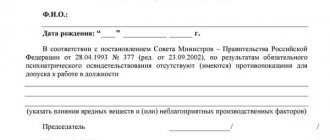Home / Labor Law / Employment / Hiring
Back
Published: 06/23/2016
Reading time: 5 min
0
1818
Refusal to hire is a fairly common practice among employers. It often happens that the candidate himself realizes at one of the stages of employment that he is not suitable for a particular position and leaves, but it often happens the other way around.
Unreasonable refusal of employment is prohibited by the Labor Code of the Russian Federation , and, therefore, can be challenged in court if the candidate has not resigned himself and is going to achieve justice. In our article we will analyze in detail the most important questions that the reader may have, and also provide examples from judicial practice.
- Legislation of the Russian Federation
- Concept and types of unjustified refusal
- Mechanism of action after refusal: appeal and employer liability
- Judicial practice regarding unjustified refusals First example
- Second example
Who should not be refused work?
In addition to the principles on the issue of unreasonable refusal to hire, Article 64 of the Labor Code establishes groups of persons who can be justifiably refused only due to the absence of any professional characteristics, these are:
- employees who get a job at the written invitation of the employer, having previously resigned from their previous job;
- pregnant women, as well as those with children, if these characteristics had an impact on the employer’s decision regarding hiring a candidate.
What is an unreasonable refusal?
Russian labor law prohibits unjustified refusal to hire. Based on Art. 64 of the Labor Code of the Russian Federation, three types of unreasonable refusal can be distinguished:
1) without specifying a reason;
2) for reasons expressly prohibited by labor legislation (for example, discriminatory refusal);
3) for reasons that do not relate to the employee’s business qualities.
If the court finds that the candidate was not hired for the position due to circumstances related to his business qualities, such refusal by the employer is justified.
Reasons for refusal to hire: unlawful and discriminatory motives
If in any way a refusal to hire restricts a person’s right to work, such a refusal, according to the norms of the current labor legislation, is considered unlawful. Thus, denial of employment is considered illegal:
- applicant due to age restrictions, nationality, religion, race, political beliefs, language and other characteristics that are not related to the professional qualities of the candidate;
- a woman who is pregnant or has children;
- a citizen of Russia who, for some reason, does not have registration at the place of residence/stay or at the location of the employer;
- An HIV-infected applicant due to his illness;
- to the applicant depending on his membership or non-membership in a trade union;
- a person who has the status of a disabled person and is assigned to employment under a job quota;
- an applicant who was sent to a position by a court decision obliging the employer to conclude an employment contract with him;
- a candidate who was elected to a position or received the right to fill it as a result of a competition;
- an employee who was invited to a position by transfer (if he came for employment within a month from the date of dismissal from his previous place of work).
Legal actions of the employer
Before refusing to hire an employee, it is necessary to ensure the legality of the motives that prompted the employer to make such a decision. In accordance with Art. 64 of the Labor Code of the Russian Federation, it is permissible to refuse employment on the following grounds:
- lack of necessary business qualities in the candidate}
- direct indication of the Law.
Refusal due to the employee’s business qualities
The Labor Code of the Russian Federation does not provide a specific definition of what exactly constitutes the business qualities of an applicant. However, the Plenum of the Armed Forces of the Russian Federation dated March 17, 2004 recommends that professional, qualification and personal qualities of a candidate, on the basis of which he can perform certain labor tasks, be considered businesslike.
For example, if during the trial it is established that the employer refused to hire in the absence of documents confirming the necessary qualifications of the employee, then this decision will be recognized as legal (clause 10 of the Plenum of the Armed Forces of the Russian Federation of March 17, 2004).
Cases of mandatory refusal
The legislation also provides for a number of other conditions, in the presence of which, the manager is obliged to refuse employment:
- the candidate has not reached the age specified in Art. 63 Labor Code of the Russian Federation}
- There are no documents provided in accordance with Art. 65 Labor Code of the Russian Federation}
- there is an entry in the work book about the deprivation of the right to hold certain positions or engage in certain activities}
- the candidate refuses to comply with the legal requirements of the employer provided for by labor legislation. For example, from undergoing a mandatory medical examination.
In addition to the above basic conditions provided for by labor legislation, there are a number of additional regulations that limit employment. For example, in accordance with Article 53 of the Law of the Russian Federation of July 10, 1992 No. 3266-1 “On Education,” it is prohibited to allow persons who have an outstanding or unexpunged criminal record to engage in teaching activities.
Liability for unjustified refusal to hire
An illegal or unmotivated refusal by an employer to employ an applicant may result in disciplinary, administrative and even criminal liability. Thus, guilty officials of companies who are brought to disciplinary liability are subject to penalties in the form of a reprimand, reprimand, or dismissal. Also, according to Article 5.27 of the Code of Administrative Offenses of the Russian Federation, in case of violation of labor and labor protection legislation, a fine is provided:
- for an official – 5,000 rubles;
- for organizations - 30,000-50,000 rubles or suspension of the organization’s economic activities for up to 90 days.
Important! Repeated violation of labor and labor protection legislation by the same person entails disqualification for up to 3 years.
Criminal liability is provided for refusal to conclude an employment contract with a pregnant woman or a candidate with children under 3 years of age. The perpetrator may be fined up to 200,000 rubles or in the amount of wages, as well as other income of the convicted person for a period of 18 months, or assigned to compulsory work for a period of up to 180 hours.
Responsibility measures
If an employer refuses an applicant without any legitimate reasons, then this can be called a direct violation of the law, for which the culprit will be punished. The perpetrators will be held administratively liable in accordance with Art. 5.27 Code of Administrative Offenses of the Russian Federation. The punishment is established in the form of a fine in the following amount:
- officials - from 10,000 to 20,000 rubles;
- individual entrepreneurs - from 5,000 to 10,000 rubles;
- <organizations having the status of a legal entity - from 50,000 to 100,000 rubles.
The Code of Administrative Offenses of the Russian Federation provides for an administrative fine for disseminating information about vacancies that contain conditions of a discriminatory nature (Article 13.11.1 of the Code of Administrative Offenses of the Russian Federation).
Denial of employment to a woman if she is pregnant or has children under 3 years of age is subject to criminal liability in accordance with Art. 145 of the Criminal Code of the Russian Federation (CC RF). The perpetrator may face:
- a fine of up to 200,000 rubles, or in the amount of the earnings of the guilty person for a period of up to 18 months;
- compulsory work for a period of up to 360 hours.
Responsibility for refusal to hire will be borne by the person who has the right to hire and fire employees.
Justified and legal reasons for refusal to hire
An employer who has decided to refuse to hire an applicant must rely on legislative documents, acts, if they comply, should be indicated in a written refusal in order to correctly argue their point of view. The main regulatory legal acts that an employer has the right to refer to in case of a reasoned refusal to hire, depending on the situation:
- for persons under 16 years of age and 14 years of age, in the absence of parental consent, the employer has the right to refuse employment in accordance with Art. 63 Labor Code of the Russian Federation;
- a citizen may be refused employment with reason if all necessary documents are not provided - Article 65 of the Labor Code of the Russian Federation: identification document of the applicant;
- certificate of pension insurance;
- document on education and special knowledge;
- certificate of presence/absence of criminal record or fact of criminal prosecution (on request)
- military registration document;
- employment history.
In addition, the employer can justify the refusal to hire on other legal grounds that are not supported by the norms of documents, but are no less significant for the normal functioning of the organization in the future, these are:
- the applicant lacks a certain education, qualifications and other professional qualifications;
- lack of practical experience in this field;
- the applicant lacks special knowledge and skills to fill the vacant position;
- the applicant’s lack of certain personal qualities that are necessary to perform work within the given position, for example, inability to find compromises, which can create certain difficulties in communicating with clients, etc.;
- if there is a conclusion from a medical commission about the candidate’s health condition, which does not allow him to hold this position;
- absence of a vacant position at the time of the applicant’s application, which must be confirmed by the staffing table;
- conducting an interview with a person who was not authorized to do so.
Legitimate reasons for refusal
In order for the employer’s negative response to be justified and motivated, it is necessary to refer to the fact that the employee does not have the required qualities that are paramount for carrying out this type of work activity. These qualities mean the ability to perform labor functions and compliance with professional requirements.
Professional qualities include appropriate education and experience in the profession, the required specialization or qualification level. Personal - the level of communication, the ability to clearly follow the orders of the manager, health parameters, achievements in the profession.
An employer’s refusal to hire may be considered legal in the following situations:
- A minor citizen who has not received permission from parents or legal representatives for employment.
- The documents required for registration were not presented.
- The work involves difficult working conditions, and the candidate is female. Women are prohibited from carrying heavy loads, and mothers of large families with small children are not allowed to engage in activities with irregular work schedules. Minor applicants can be rejected for the same reason: they should not lift heavy objects, endure excessive mental stress, or perform work under hazardous working conditions.
- The applicant for civil service does not speak Russian.
- There is a disqualification recorded in the work book.
- The applicant has a court-ordered restriction on performing certain job duties.
- The citizen has mental illness.
- Foreigners who apply for activities related to state secrets.
You can refuse for other reasons if they have clear arguments.
How to formalize a refusal to hire
As a rule, if an applicant is refused a job, the employer informs him about this verbally. However, the candidate has the right to demand a written explanation from the employer. Article 64 of the Labor Code of the Russian Federation establishes the exact period during which the employer must provide the applicant with a written refusal to hire - this is seven working days from the date of presentation of the request for its provision. To issue a written refusal in accordance with all the rules, it must be supplemented with the following details:
- the full name of the organization is indicated;
- the signature of the manager or authorized person responsible for hiring and dismissing the employee is affixed;
- certified by the seal of the organization or the HR department of the organization.
As mentioned above, the notification must contain a description of the reason for refusal of employment in compliance with all legal norms and not contain discriminatory language; if possible, indicate the rule of law.
Important! If the employer cannot prove a motivated reason for the refusal, his behavior may be interpreted as an unfounded refusal to hire, which may lead to the applicant going to court.
The law does not establish the need for registration of a document, but personnel officers recommend not to deviate from this rule and be sure to enter the document in the log of outgoing correspondence indicating the details, method and date of sending the letter to the applicant, especially if the document is sent by post. The document should be sent by mail with a description attached and a return receipt.
What to do if you were wrongfully denied a job?
Of course, in most cases, even during the interview it becomes obvious whether this vacancy is suitable for you. Obvious to both you and the employer, but solely based on your business qualities, that is:
- Education relevant to the vacancy;
- Similar work experience;
- Sufficient experience to perform the required duties;
- Qualifications or other indicator in this field.
Education and experience are quite often attributed to personal qualities. Moreover, this list includes both health, which will allow you to perform the functions established by the position, and various character traits or socialization. That is, personal qualities include both appearance and eloquence or the ability to establish communication with completely different people. However, the employer does not have the right to refuse based only on personal qualities, or completely focusing on the unlawful reason for refusal.
The fact is that freedom of personnel selection, distribution and dismissal for the sake of ensuring the economic efficiency of the organization is a right, but not an obligation of the employer. That is, the legislation prevents unnecessary restrictions on the part of the employer, allowing each applicant to prove in court that he is worthy to fill the vacancy offered by the organization.
In order to appeal the employer’s refusal, you will need to go to court in accordance with Part 6 of Art. 64 Labor Code of the Russian Federation. But for this you will need a document indicating that you were refused. Without a written refusal, it will be extremely difficult for you to defend your own rights. For this reason, we strongly recommend that you obtain legal advice online if your rights have been violated.
Refusal to hire: inconsistency of business qualities
This reason for a motivated refusal to hire is very common, since it does not require specifying the conditions established by federal laws. However, the relevant Resolution of the Supreme Court of the Russian Federation obliges the employer, when choosing this reason, to provide full justification for his point of view. In addition to studying the documents provided, in order to analyze the personal and business qualities of the candidate, the employer has the right to test the applicant, hold a competition between candidates and compare their results, and conduct a detailed interview with a large number of different questions.
Applicants' rights
On the other hand, current legislation contains a number of guarantees that guarantee the protection of the rights of employees, as the more vulnerable party in labor relations. In particular, the Constitution of the Russian Federation proclaims the principle of freedom of labor (Article 37). One of the main guarantees aimed at implementing this rule is the prohibition of unjustified refusal to hire.
In addition, in the Plenum of the Supreme Council dated March 17, 2004. No. 2 indicates a similar legal position. In cases where a refusal to hire is appealed in court, it should be assumed that every citizen has the same rights and opportunities when concluding an employment contract. Any discrimination is prohibited.
Thus, the legislator has established certain frameworks within which the employer must act when hiring new employees, namely, he has imposed a ban on unjustified refusals to conclude employment agreements.
Disputes about refusal to hire
In accordance with Part 6 of Article 64 of the Labor Code of the Russian Federation, if, in the opinion of the applicant, the refusal to hire is illegal and unfounded, he has the right to appeal this decision of the employer in court. At the same time, according to Article 3 of the Labor Code of the Russian Federation, a person who believes that he was discriminated against by an employer when hiring has the right to demand in court to eliminate this violation, as well as compensation for damage and compensation for moral damage.
Important! The question of whether discrimination occurred when refusing to conclude an employment contract is decided in court only when considering a specific case, since the current legislation contains only an approximate list of reasons when an employer does not have the right to refuse an applicant employment.
Articles 381 and 391 of the Labor Code of the Russian Federation establish that a labor dispute over a refusal to hire falls within the competence of district courts. A claim against an organization is brought by the applicant at its location (Article 28 of the Code of Civil Procedure of the Russian Federation). Since any civil process is adversarial in nature, the employee is obliged to prove the circumstances that have legal significance for this dispute - the non-compliance of this refusal with the current norms of Russian labor legislation, and the employer to provide existing objections - to prove the legality of his actions, in particular the fact that the business qualities of the applicant position does not meet the employer's requirements for the candidate.
Important! The legislator takes a very sensitive approach to labor disputes regarding the issue of refusal to hire, since concluding an employment contract with a specific applicant is a right, not an obligation, for the employer. The Plenum of the Supreme Court of the Russian Federation gave an explanation: when considering such cases, the court must establish whether the employer made an offer about the vacancies available to him (for example, it was announced on the radio, an advertisement was placed in newspapers and other media, a message about the vacancy was transmitted to the service authorities employment, etc.), whether direct negotiations were held with the applicant about employment and on what grounds the decision was made to refuse employment.
The court's decision to satisfy the plaintiff's demands is the basis for the emergence of labor relations. By satisfying the person's claim, the court recognizes the refusal to hire as illegal and unfounded, and thereby obliges the employer to conclude an employment contract with the applicant in the manner prescribed by Article 68 of the Labor Code of the Russian Federation. In particular, the court decision may indicate from what date the employee must begin performing official duties at a new job.
What to do in case of an unreasonable refusal?
Part 6 of Article 64 of the Labor Code of the Russian Federation establishes the provision that an employer’s unlawful refusal to conclude an employment contract with an applicant can be appealed in court. That is, for example, appealing to the State Labor Inspectorate (state labor inspectorate) to resolve this issue is pointless - this is not within its competence. Such cases are subject to consideration in the prescribed manner by district courts. In this case, the period for applying to the court is three months from the moment when the person looking for work learned about the illegality of the refusal to sign an employment contract with him.
In the statement of claim, the applicant needs to structuredly and consistently set out all the circumstances of the failed employment and, most importantly, make a demand to recognize the refusal to hire as illegal.
Do not forget in the statement of claim to ask the court to oblige the defendant:
- compensate for the losses incurred by the plaintiff (this may include the payment of state duty and lost earnings that the applicant could have received if he had not encountered discrimination when hiring);
- compensate the candidate for moral damages;
- as a result, still conclude an employment contract.
If you believe that you were denied a job illegally, you must obtain a written refusal from the employer.
And only with this document go to court. Since the absence of such a document, or at least confirmation of the fact that a citizen has contacted a given employer regarding employment, will put the plaintiff in a very difficult position during the trial. This will make his position more unstable and reduce the chances of winning the case. Rate the quality of the article. Your opinion is important to us:
What refusal is considered unfounded?
Article 64 of the Labor Code of the Russian Federation helps answer this question. It defines a refusal as unfounded if:
- the employer did not indicate the reason for the refusal;
- indicated a clearly discriminatory reason (for example, the gender of the applicant);
- or indicated a reason not related to the employee’s business qualities.
If employment is denied, a written document containing the reason should be requested. Because without such a document, it will be quite difficult, almost impossible, for the applicant to protect his legal rights.
Based on all of the above, we can state the following conclusion: there can only legally exist two grounds for refusing a job. The first is that the candidate for the vacancy lacks the business qualities necessary to perform the job. And the second is the applicant’s non-compliance with the legal requirements or their failure to fulfill them.
That is, to improve understanding, we can give the following examples: refusing a candidate with an economic education for a civil engineer vacancy is quite legitimate. Or, refusing to hire an applicant due to age discrepancy will also have legal grounds if the work is carried out in hazardous conditions and the candidate is a minor.
Speaking about inconsistency in business qualities, we note that this issue is much more complicated, since there are no sources of law that clearly define this concept, and the current legislation has not formally defined the content of this term.
Rules of law when refusing a job to an applicant
The legislative basis for an applicant who is unreasonably not hired is the following legal and judicial acts:
- Constitution of the Russian Federation (Article 37) and Labor Code of the Russian Federation (Article 2) . They pay special attention to the principle of freedom of labor. It means that any person has the right personally, based on his abilities, education and skills, to choose a direction of activity and profession. The guarantee of the implementation of this right is the legally established prohibition of unreasonable refusal to sign an employment agreement.
- Labor Code of the Russian Federation (Article 64) . To protect potential employees in the legal field, the employer has established a number of restrictions regarding the hiring procedure. The main one is the prohibition of unreasonable refusal of employment. It extends to limiting the rights of persons applying for a position or providing them with advantages in drawing up an employment agreement based on circumstances not related to professional qualities. This also includes discrimination on a number of grounds: place of residence (registration), race (nationality), status (financial, social), gender, etc.
- ILO Convention No. 111, 1958 (ratified). This document, as well as Article 19 of the Basic Law and Article 3 of the Labor Code, recognizes the above actions as discrimination.
- GD of the RF Armed Forces No. 2 of March 17, 2004 It examines clarifications from judicial practice regarding the application of labor legislation by courts. It is noted here that in disputes about employers’ refusals to hire candidates, everyone is guaranteed equal opportunities to enter into an agreement, excluding any discrimination.
Does an applicant have the right to demand an explanation of the reasons for refusal to conclude an employment contract?
The law obliges any employer, when an applicant contacts him, to explain why he was not suitable for the vacant position (Part 5 of Article 64 of the Labor Code). In addition, he has the right to inquire what normative act confirms the legality of such a decision.
The requirement according to the rules is made in writing and should not be left without explanation. Moreover, the answer is prepared in the same form. Justifications must be complete, excluding additional questions.
The maximum period for preparing a response by the employer is 7 (seven) working days from the date of receipt of the corresponding request.
8(800)350-23-68
Dmitry Konstantinovich
Expert of the site "Legal Consultant"
Ask a Question
If there are no usual restrictions established by law, the position is not accepted due to the applicant’s business qualities not meeting the organization’s requirements. This position is motivated, but there is a nuance. It will be difficult for an employer to prove this reason if there are no detailed job descriptions indicating the candidate’s required qualification level, knowledge and skills that allow him to perform the job.
Refusal to hire due to staff reduction
Reducing the number or staff of an enterprise is a rather sensitive procedure from a legal point of view. Some employees are fired, but there cannot be any talk of hiring other personnel for these positions, otherwise the reduction will be illegal.
However, it may well be that due to the “redrawing” of the staffing table, other positions appear, or during the reduction, certain vacancies open up, and candidates want to fill them.
IMPORTANT! Former company employees who are laid off due to staff reduction have priority in employment. First of all, new vacancies should be offered to them. Only if a written refusal has been received from them, recruitment for these positions can be announced among outsiders.
If a redundant employee refuses existing vacancies and is fired, and then wants to take one of the newly created vacancies, he will also have priority over other applicants. Although it is important to remember that the employer is not obliged to inform a previously dismissed employee about the vacancy.
In any case, staff reduction cannot in any way be considered an independent legitimate reason for refusing to conclude an employment contract.
Arbitrage practice
They do not often go to court on this issue. The reason is legal illiteracy. According to statistics, employers often win court cases. The trick of unscrupulous employers: the decision is communicated by an unauthorized person, as a result of which the candidate cannot provide such an answer as evidence of a violation of his rights.
Labor dispute according to Art. 381 and art. 391 of the Labor Code of the Russian Federation is considered by the district court. Art. 28 of the Code of Civil Procedure of the Russian Federation states that the claim is filed at the location of the defendant’s organization.
Examples from judicial practice
Case #1. Refusal to hire a pregnant woman
The plaintiff successfully passed all stages of selection for the position of teacher.
The documents were sent to the city administration, after which she was given a referral for a medical examination. The employee was familiarized with the work schedule and workplace, introduced to colleagues, and after receiving the list of students, he began his duties. The next day, the plaintiff was asked to go to the director's office, where the midwife and the head of the clinic were present. Having the employee’s medical card in hand, he asked her a question about her planned maternity leave. After this, the director returned the package of documents to the plaintiff and threatened to report her to the police for fraud, since she hid her pregnancy.
When filing an application with the court, the plaintiff demanded that the refusal of employment be declared illegal. Explanations of the defendant: the plaintiff did not pass the sanitary minimum, but refused the position voluntarily.
Considering the following circumstances, the court decided in favor of the plaintiff:
- testimony of witnesses about the fact that the employee was allowed to work;
- documentary confirmation;
- the plaintiff’s signatures, which were affixed to all papers;
- the defendant demanded the provision of documents that were not provided for in Art. 65 Labor Code of the Russian Federation;
- Passing the sanitary minimum in the SES is not mandatory for a teacher.
An employee can undergo a sanitary minimum after being hired for a position. According to the court's decision, the defendant entered into an employment contract with the plaintiff and made all payments.










